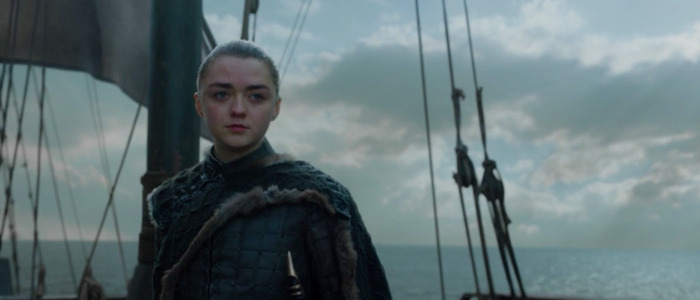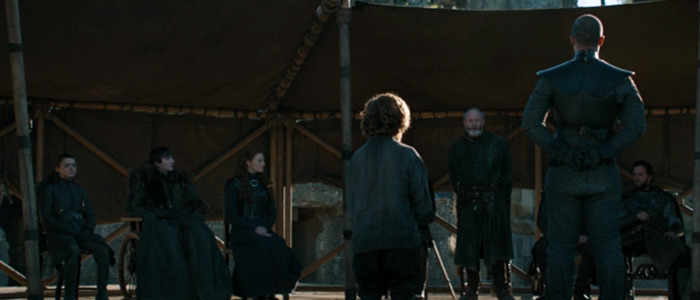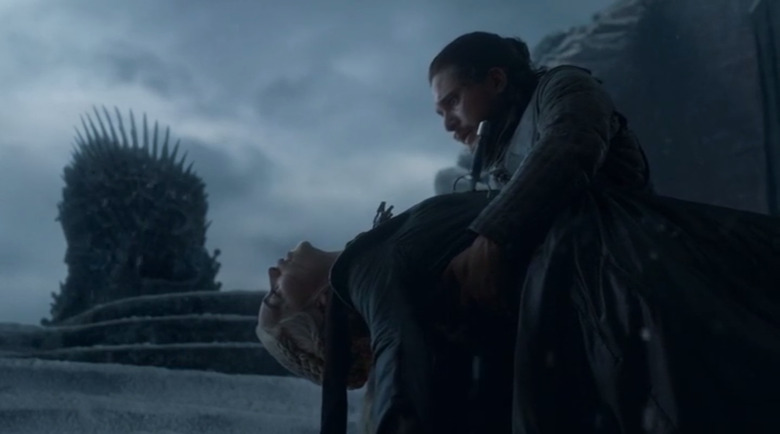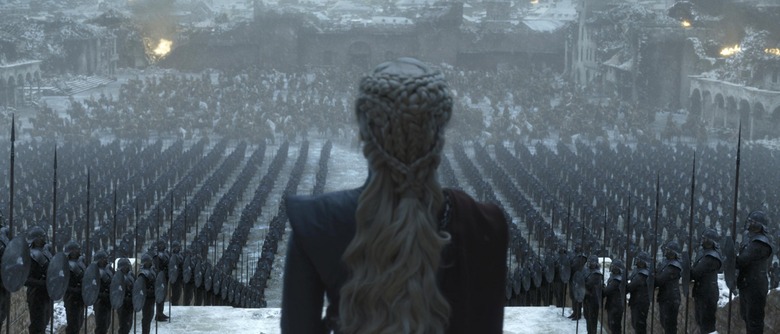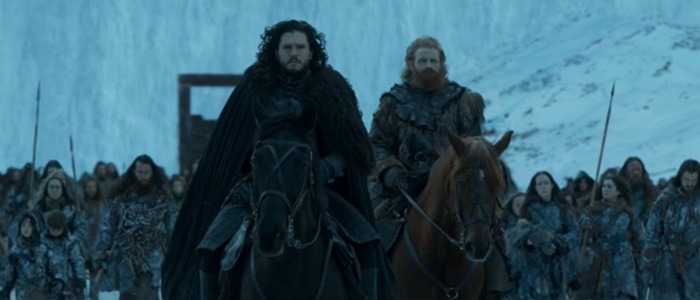The 'Game Of Thrones' Finale: What Worked And What Didn't Work
The final season of Game of Thrones has been divisive at best. The rushed pacing and certain character choices left many fans feeling bitter after the penultimate episode, "The Bells". I was one of those fans, and I detailed my grievances with the series as I prepared for the final episode. I prepared myself to be angry, to be bitter, but above all, to be disappointed. Imagine my complete shock when the episode moved me to tears.The final episode of Game of Thrones, "The Iron Throne", delivered on many of the series' most important character arcs. The series has always been at its best when it focuses on the characters and their personal journeys, and "The Iron Throne" gave us some satisfying conclusions for the characters who deserved it most. It wasn't a perfect episode, as uneven as much of this season, but the big emotional beats worked – offering some catharsis after the upheaval from the previous episode. This may be the only real ending fans ever get, with the finale two books constantly being pushed back by series author George R.R. Martin.Here's a look at what worked and what didn't, and why some fans feel worse about the ending than others – though no one needs to be making petitions.
What Worked: The Stark Girls Get a Proper Sendoff
Though the series has come under fire for its treatment of female characters, both Sansa and Arya Stark received deeply satisfying endings. Both girls are unconventional – Arya is a tomboy who would rather stick 'em with the pointy end than play with dolls, and Sansa is a genius political strategist with an angel's face. They're brilliant and throughout the years have become two fan favorites, with many suggesting that either of them should end up on the Iron Throne.Instead, the Iron Throne was melted down in a fun but predictable scene by the enraged Drogon. Arya and Sansa are among those who get to choose the new king, a move away from traditional monarchies defined by blood lineage. Sansa telling her uncle Edmure to shut up and sit down is as powerful as it is funny, and these little moments make the finale sing.In the end, Sansa refuses to bend the knee and is crowned Queen of the North. It's a perfect end for her arc, because we know she will be a just and fair ruler. She knows what is best for her people, and to see her succeed after so much suffering is cathartic.Arya decides to Magellan it off to wherever is West of Westeros. She's a face-stealing, Night King-slaying beast. The final shot of Arya mirrors the final shot of Season 4, when Arya boards a ship to Essos to find the Faceless Men. This is just the next step in her adventure, and it's bittersweet we won't get to see it.
What Didn’t Work: Bran the Broken
Unlike his sisters, Bran's arc ended in a way that didn't feel narratively sound. He's nominated by Tyrion for kinghood and everyone is on board pretty quickly – despite some individuals clearly not wanting to hear what Tyrion has to say from the jump. Grey Worm moves from wanting Tyrion and Jon's heads on sticks to going along with whatever Tyrion suggests. Peter Dinklage is doing incredible work, but it's not enough to warrant Grey Worm's change of mind or the instant agreement of a bunch of lords and ladies who would probably argue for the throne before giving it up to a kid who talks like the caterpillar from Alice in Wonderland.While Bran's arc is significantly more fleshed out in the novels, he hasn't really done much in the television series. He's a weird buzzkill who interrupts the other characters to deliver cryptic messages. His powers are never fully explained, either, and it's revealed during his ascension to the throne that he knew he would be king all along. If he could predict the future, maybe he could have said something to prevent the entirety of "The Bells"?I'm fine with Bran being kinged as a book reader, because I know enough about the character, his powers, and the knowledge he has to justify his coronation. Based solely on the television series, however, it feels like a weird pick. It's not likely that the surviving nobility of Westeros are going to be cool with Sansa ruling the North while her brother rules the South, giving the wolf's share of power to the Starks. Like many of the other reveals this season, it feels rushed. More attention paid to Bran's story and characterization could have created a much stronger impact.Additionally, the moniker of "Bran the Broken" feels mean-spirited, even for Westeros. While it's refreshing to see a disabled character in a position of power, the way it was handled feels more exploitative than representative.
What (Mostly) Worked: Jon and Dany
Daenerys' heel-turn in "The Bells" didn't sit right with a lot of people. She went from benevolent breaker of chains to raging tyrant, killing women and children with abandon. Even Emelia Clarke has been vocal about her frustrations with the character's final scenes.Some of that is redeemed in "The Iron Throne", though it's not a redemption of Dany's character. Instead, we're finally presented with a way of viewing her descent into madness – she has always been bloodthirsty, it's just that she was killing evil men previously. Her bloodlust has been there all along, it's just been targeted towards those who her allies believed deserved it. While this isn't a perfect explanation, it at least provides a glimpse into the thinking behind her character twist, and helps it go down a bit more easily.Jon being the one to kill Dany was essential. Though their relationship never really had much weight because we didn't get time to understand it (a'la Jon and Ygritte), there's power in Jon realizing he's the only one who can stop her. It comes full circle, back to the very first episode when Ned taught Bran about the delivery of justice. Jon must be the one to kill Dany, because he's the one who helped elevate her to power on Westerosi shores. It is his burden not only because he's the only one who can get close, but because he loves her, too.Dany dying in Jon's arms with ash falling around them like snow is a beautiful sequence, and Drogon's surprisingly nuanced response – burning the throne Dany longed for instead of burning Jon – is a solid conclusion to the Mother of Dragon's arc. With more episodes and time, we might have gotten a better characterization and the spiral into madness would have felt organic, but at least the series' weakest romantic pairing had a strong romantic end.Jon facing banishment at the Wall once more is another great mirror to the first episode, though his trek beyond the wall with Tormund afterward is more gratifying. Even in these successful moments, though, there are numerous unanswered questions.
What Didn’t Work at All: The Season’s Pacing and Unanswered Questions
Much has been said about the rushed nature of this season and how much that aspect hurt the series. Instead of waxing poetic about the missed opportunities and character choices that felt wholly unmotivated, instead ponder these riddles:Why did the white horse appear to Arya in "The Bells" only to disappear completely before the next episode?What the heck happened in Dorne? How did the new prince come to power? What happened to any of Oberyn's remaining daughters? Since when does Dorne bend the knee?What about the prophecies? Not just the book-only valonqar, but Arya's green-eyed victim? Azor Ahai? The red comet? Many of the series' early prognostications seemed to have been forgotten entirely.What happened to the Freys? We see Edmure Tully being his typical milquetoast self, but how did he get out of the dungeons at the Twins? Did Arya free him when she was there killing Walder Frey?What happens now that the Night King is dead? Will the Children of the Forest be able to return? Will the decade-long winters finally come to an end?
Final Thoughts: “Everyone loves a good story.”
While the major plot beats in "The Iron Throne" were satisfying enough, the biggest takeaway from the episode lies in one sequence. There are several meta-references to storytelling, including the printed Song of Ice and Fire compiled by the maesters and Tyrion's speech regarding Bran. The moment of personal storytelling comes in the form of Brienne of Tarth finishing Jaime Lannister's section in the annals of the Kingsguard. She chooses to give him the honorable ending he never got in life, changing his narrative after the fact. Jaime was a monster, but Brienne chose to see the human in him.We all want happy endings, but seldom get them. Instead of holding Jaime in her heart with bitterness, Brienne chose to find her own version of the happy ending. She highlighted what was good about the man she loved, believing that was more important than the objective truth. It's a complicated statement about the unreliability of narrators, and about how people choose to tell their stories.Jon asks Tyrion if he did the right thing in killing Dany, and Tyrion tells him to ask again in ten years. How will the deeds of Jon Snow be viewed in a decade? With time to process and inevitable changes in the pop culture landscape, will we view him as a tragic hero, a villain, or something else entirely? These questions are the ones that made the finale something more than just satisfying. I just wish they had focused on answering the questions already up in the air before posing new ones.Everyone loves a good story, and in the end, Game of Thrones was still a damn good story.

